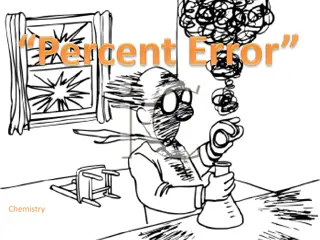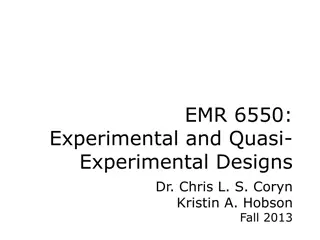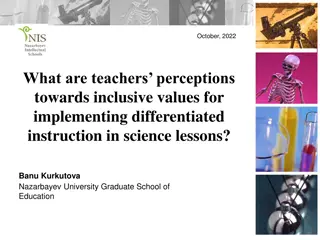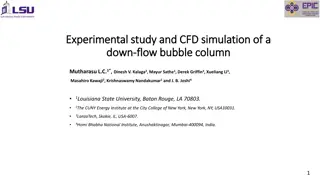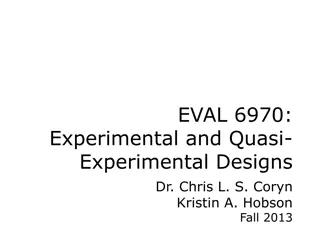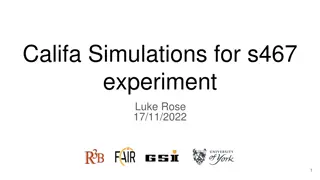Introduction to Experimental Economics by John Hey: A Comprehensive Overview
Explore the interconnected realms of Experimental Economics and Behavioral Economics through the insightful lectures of John Hey, an Emeritus Professor at the University of York. Discover the methodology of testing economic theories for validity and the practical applications of experimental economi
1 views • 58 slides
Insights on Experimental ASF Vaccines in Pig Studies
The research conducted by Prof. Jishu Shi and his team at Kansas State University delves into the safety and efficacy testing of experimental African Swine Fever (ASF) vaccines using pigs as the model. Various vaccines, including DNA vaccines and live attenuated viruses, were tested against differen
4 views • 13 slides
Implementing Our Values in Action Toolkit for Team Development
This toolkit focuses on utilizing Our Values in action within teams at Queen Mary to reinforce positive behaviors and create a supportive work culture. Managers are encouraged to lead discussions, allocate work based on values alignment, incorporate values in 1-to-1 meetings, and plan for a Values A
5 views • 19 slides
Understanding Family Morals, Values, and Rules
Developing family morals and values is essential for guiding children and fostering a harmonious family environment. Morals, values, and rules play a crucial role in shaping individual behaviors and decision-making processes. By establishing family guidelines based on strong morals and values, paren
5 views • 15 slides
Discussion of Randomized Experiments and Experimental Design Challenges
Randomized experiments face statistical power challenges due to rare outcomes and high variance. Stratifying randomization can help control for correlated residual variance based on baseline values of outcomes. Implications for applied economists include addressing attrition and treatment effect het
0 views • 6 slides
Growing Careers for Positive Change: Aligning Actions with Values
The lesson focuses on helping individuals align their actions with their values, emphasizing the impact of intrinsic and extrinsic values on personal wellbeing and decision-making. Through activities like Diamond 9 Values, students explore the importance of values in career choice and relationships,
1 views • 15 slides
Understanding Values, Beliefs, and Personal Values in Everyday Life
Our values and beliefs shape how we think, act, and make decisions in everyday life. Whether conscious or not, they influence our behavior and attitudes. This article explores the definitions and importance of beliefs, values, and personal values, highlighting how they impact individual decision-mak
0 views • 27 slides
The Importance of Values in Building Harmonious Communities
Values play a crucial role in shaping individual behavior, organizational culture, and community interactions. Shared values are essential for promoting harmony, achieving common goals, and fostering mutual respect. When values are not aligned, it leads to conflicts, inefficiencies, and dissatisfact
0 views • 41 slides
Understanding Nonexperimental and Quasi-experimental Studies
Nonexperimental and quasi-experimental studies resemble experiments but lack random assignment, making them valuable for group comparisons without establishing causation. This type of research design looks at differences between groups that already exist, focusing on group differences rather than ca
1 views • 35 slides
Understanding Experiments in Research: Observation vs. Experimentation
Observation and experiments are two crucial methods in research. An observational study involves observing and measuring variables without influencing responses, while an experiment deliberately applies treatments to measure responses. Confounding variables can affect the results, and factors like e
0 views • 13 slides
Understanding Ethics, Values, and Universal Morality
Explore the concepts of ethics, universal values, and morality in a multicultural context through Education for Justice (E4J) Integrity and Ethics Module 2. Delve into topics such as the Universal Declaration on Human Rights, enacting universal values, moral relativism, and more. Gain insights on th
6 views • 14 slides
Understanding Experimental Psychology: Designs and Control Issues in Research
This content delves into the basics of experimental research, focusing on different types of experimental designs and control issues. It covers between-group and within-group designs, discussing advantages and disadvantages, as well as methods for controlling for nonequivalence. The importance of ra
0 views • 26 slides
Exploring Personal Values in Everyday Life
Discover the importance of values in decision-making and personal development. Engage in activities such as identifying personal values, ranking their importance, and creating a self-identity puzzle. Understand how values influence choices and relationships. Connect values to career decisions and fi
0 views • 9 slides
Exploring Core Values in Higher Education Institutions
Unravel the importance of core values in higher education institutions, examining the interplay between organizational culture, decision-making processes, and the alignment of values with faith and professional beliefs. Delve into the diverse types of values, from permission-to-play to aspirational
0 views • 29 slides
Understanding Probability: Experimental and Theoretical Concepts
Probability is the measure of the likelihood of an event happening, with experimental and theoretical probability being key concepts. Experimental probability involves determining probabilities through experience or experiments, while theoretical probability can be calculated without prior experienc
2 views • 23 slides
Calculation and Validation of Thermal Neutron Diffusion Length in Water at Elevated Temperatures
This research focuses on the validation of thermal neutron diffusion experiments in water at elevated temperatures. Various methods, including the pulsed-neutron die-away and static relaxation length methods, were used to determine the diffusion length (L). Through linear and power fits based on dat
0 views • 7 slides
Understanding Percent Error in Chemistry
In chemistry, understanding the concept of percent error is crucial for evaluating the accuracy of experimental results compared to accepted values. This post covers the definitions of accepted and experimental values, the formula for calculating percent error, and provides examples and practice pro
0 views • 11 slides
Exploring Values Education in Nordic Preschools
This study delves into the perception and handling of values in Nordic preschools, focusing on caring, disciplinary, and democratic values. It aims to uncover whether conflicting or co-existing values prevail within individual preschools and across Nordic countries. Definitions of values, including
0 views • 16 slides
Understanding Moral and Constitutional Values in Relation to Judiciary
Explore the concepts of moral values and constitutional values, emphasizing their importance in decision-making processes and societal norms. Discover the stages of moral development and delve into constitutional values such as sovereignty, socialism, secularism, democracy, justice, liberty, equalit
0 views • 9 slides
Analysis of Absorption Properties of Conjugated Dyes
The analysis focuses on the absorption properties of conjugated dyes such as 1,1-diethyl-2,2-cyanine iodide (red), 1,1-diethyl-2,2-carbocyanine iodide (blue), and 1,1-diethyl-2,2-dicarbocyanine iodide (turquoise). It involves calculating lambda max for each dye based on a particle in a box model, co
0 views • 15 slides
Quiz Review on Scientific Method and Graphing
Explore a quiz review covering topics related to scientific method, graphing, and experimental design. Understand key concepts such as hypothesis, scientific law, theory, variables, and experimental control through detailed questions and images. Test your knowledge on laboratory safety, inferences,
0 views • 14 slides
Understanding Quantitative Research Designs in Nursing
Delve into the world of quantitative research in nursing, exploring different research designs and the concept of causality. Learn about experimental, quasi-experimental, and non-experimental designs, as well as the characteristics of experimental design like manipulation, control, and randomization
0 views • 22 slides
Quasi-Experimental and Interrupted Time-Series Designs Overview
Explore the various quasi-experimental designs, control groups, pretests, and outcome patterns in research methodologies. Understand the implications of different outcome patterns on causal interpretation and validity threats in experimental studies.
0 views • 31 slides
Understanding the Importance of Core Values in Parish Life
Exploring the significance of core values in parish communities, this content delves into how these values shape beliefs, practices, and decision-making processes. From defining core values to linking personal convictions with those of the parish, it highlights the essential role of consistent, pass
0 views • 29 slides
Understanding Experimental Design in Biology
Explore key concepts in experimental design in biology through clicker questions focusing on hypotheses, variables, control groups, and experimental groups. Learn how scientists test hypotheses and analyze results to draw valid conclusions in biological studies.
0 views • 15 slides
Compilation and Evaluation of Experimental Data for Nuclei in Z=2-28 Region
Completed compilation and evaluation of experimental Pn and half-lives for nuclei in the Z=2-28 region, led by Balraj Singh at McMaster University. The work involved preparing lists of neutron-rich nuclides, identifying potential emitters, analyzing available experimental data for 1n, 2n, 3n, and 4n
0 views • 20 slides
Advances in Ceramic Composite Property Modeling and Experimental Characterization
European research focuses on advanced modeling of C/C, C/SiC, and SiC/SiC composites for aerospace and nuclear applications, with an emphasis on correlating simulations with experimental validation. Laboratories are progressing towards a multiscale approach, integrating micro/nanomechanical characte
0 views • 5 slides
What Motivates Paternalism? An Experimental Investigation
Centuries of normative debate on paternalism have resulted in its ubiquity in various aspects of society, from consumer protection to safety regulations. However, there is a scarcity of empirical studies on the motivations behind paternalistic interventions. This experimental investigation delves in
0 views • 12 slides
Teachers' Perceptions on Inclusive Values for Differentiated Science Instruction
Explore science teachers' perspectives on inclusive values for implementing differentiated instruction in science lessons. The study focuses on understanding how teachers perceive inclusive values in facilitating differentiated teaching, their perspectives on differentiation, strategies for implemen
0 views • 13 slides
Understanding Experimental Studies: Intervention, Characteristics, and Measurements
Experimental studies involve the investigator assigning exposures and following subjects to observe disease development. Different types of experimental studies exist, such as preventive and therapeutic types, each with its limitations, including ethical concerns and challenges in recruiting subject
0 views • 13 slides
Exploring Values-Embedded Action Research in Education
Dive into a comprehensive exploration of values-embedded action research in education, focusing on how personal values influence teaching practices and contribute to broader societal impacts. Discover the importance of understanding core values, creating valid accounts of living-theory research, and
0 views • 11 slides
Understanding Research Methods and Data Analysis
This review covers topics such as experimental classification, the comparison of non-experimental and experimental research, software features like JMP and SPSS, outlier handling in data analysis, and levels of measurement in statistical analysis.
0 views • 13 slides
Vietnam Neutrino School Overview
Vietnam School on Neutrino is an annual event started in 2017 to promote experimental neutrino physics in Vietnam. Led by Prof. Jean Tran Thanh Van, the school focuses on lectures, software and hardware training, group works, and excursions. With a mix of students from various countries, the aim is
0 views • 7 slides
Analysis of Slider-Crank Mechanism and Experimental Data
Slider-crank mechanism analysis involves understanding the transformation of input motion into desired output motion. This mechanism consists of a crank, coupler, slider, and ground link, converting circular motion into linear motion. Experimental procedures involve setting crank angles and recordin
0 views • 6 slides
Experimental Study and CFD Simulation of a Down-flow Bubble Column
This study and simulation focus on the experimental setup, measurement techniques, and results of a down-flow bubble column. It explores novel features such as inverted bubbly flow, micro-bubble generation, and gas injection. Detailed analysis includes axial and radial variations of volumetric gas h
0 views • 25 slides
Understanding Experimental and Quasi-Experimental Designs
Explore the foundations of experimental and quasi-experimental designs, delving into causal relationships, counterfactual reasoning, and the importance of validating statistical and internal conclusions. Learn about causes, effects, and the complexity of determining causation in research. Discover R
0 views • 46 slides
Understanding Probability: Learning Outcomes and Examples
This content delves into the study of probability, covering topics such as representing probabilities of simple and compound events, calculating relative frequencies, multi-step chance experiments, theoretical and experimental probabilities. It explains concepts like chance experiments, sample space
0 views • 31 slides
Understanding Experimental Studies in Epidemiology
Epidemiological studies and experimental studies play vital roles in understanding cause-and-effect relationships in research. Experimental studies involve manipulating independent variables and measuring dependent variables, with categories such as true experimental, quasi-experimental, and pre-exp
0 views • 22 slides
Califa Simulations and Experimental Observations in Nuclear Physics Research
Exploring nuclear physics research through Califa simulations and experimental observations with a focus on PID gating, clustering algorithms, beam settings, and Ca isotopes chain gating. The study involves simulating events on CH2 targets, analyzing clustering effects, and observing opening angles
0 views • 10 slides
FY25 LBS Lab OMEGA/OMEGA EP Proposed Campaign
Proposed campaign in FY25 by the LBS Lab to measure specific deliverables, compare results with experimental and theory PIs, collaborate with others, and assess technical issues such as target fabrication feasibility. The campaign involves motivation, relevant milestones, previous/simulated results,
0 views • 6 slides
















